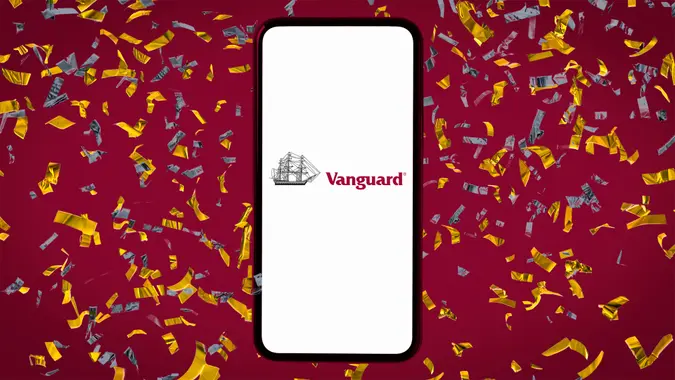CD Early Withdrawal Penalty: What It Is and How It Works

Commitment to Our Readers
GOBankingRates' editorial team is committed to bringing you unbiased reviews and information. We use data-driven methodologies to evaluate financial products and services - our reviews and ratings are not influenced by advertisers. You can read more about our editorial guidelines and our products and services review methodology.

20 Years
Helping You Live Richer

Reviewed
by Experts

Trusted by
Millions of Readers
A certificate of deposit (CD) is a type of savings account that holds your money for a set period of time, known as the term. Terms typically range from three months to 10 years.
CDs are popular because they offer fixed interest rates and low risk — but they come with a catch. Pull your money out before the CD matures and you’ll likely face an early withdrawal penalty.
What Is a CD Early Withdrawal Penalty?
CDs are designed to hold your money for the full term. If you take out your funds early, your bank may charge a penalty — usually a portion of the interest you would have earned.
Some banks allow partial withdrawals with penalties based only on the withdrawn amount, while others require you to withdraw the full balance and close the account.
Why Do Banks Charge an Early Withdrawal Penalty?
When you open a CD, you lock in a fixed interest rate. That rate benefits you if interest rates fall — but the bank takes on more risk. Early withdrawal penalties help offset that risk and encourage customers to keep their deposits in place.
How Are CD Early Withdrawal Penalties Calculated?
If you withdraw funds within the first six days of opening a CD, federal law requires a minimum penalty of seven days’ simple interest. Beyond that period, penalties vary by term and bank.
In general, the longer the CD term, the steeper the penalty:
- 12-month CD: Typically carries a 60-day interest penalty.
- Five-year CD: Could charge 180 days’ worth — or more.
CD Early Withdrawal Penalty Formula
You can estimate your penalty using this formula:
Withdrawal Penalty = Balance x (Interest Rate / 365) x Number of Penalty Days
Here’s an example: You deposit $1,000 into a CD with a 2.00% APY, and the penalty is 60 days of interest.
- Convert the interest rate: 2.00% = 0.02
- Apply the formula: $1,000 x (0.02/365) x 60 = $3.29
- In this example, you would owe $3.29 if you withdrew early from your CD.
Common Penalty Terms by Bank and CD Type
Penalties vary widely across banks. Here’s how a few institutions handle early withdrawals:
| Bank | 1-Year CD | 2-Year CD | 3-Year CD |
|---|---|---|---|
| Ally | 60 days’ interest | 60 days’ interest | 90 days’ interest |
| American Express®, Member FDIC | 270 days’ interest | 270 days’ interest | 270 days’ interest |
| Bank of America, Member FDIC | 90 days’ interest | 180 days’ interest | 180 days’ interest |
| Capital One | 90 days’ interest | 180 days’ interest | 180 days’ interest |
| First Internet Bank | 180 days’ interest | 360 days’ interest | 360 days’ interest |
When Is a CD Early Withdrawal Penalty the Right Choice?
In some situations, paying the penalty might be worth it — especially if it’s cheaper than the alternatives.
When You Need the Money for an Emergency Expense
If you’re facing an unexpected medical bill, car repair or job loss, tapping into your CD could be less costly than taking on debt.
When You Could Use the Money for a Down Payment
Using CD funds for a home down payment might make financial sense — particularly if the penalty is smaller than what you’d pay in loan interest.
Other Situations To Consider
- You find a higher-rate CD and want to reinvest
- You’re consolidating funds to simplify your finances
- You miscalculated your liquidity needs
3 Tips To Avoid CD Early Withdrawal Penalties
There are a few ways to reduce the likelihood that you’ll have to pay a penalty for withdrawing funds from your CD before it matures. Following these tips can save you money and make CD early withdrawal penalties a thing of the past.
1. Open a No-Penalty CD
If you haven’t chosen a CD yet and have concerns about early withdrawal penalties, consider a no-penalty CD. These CDs let you withdraw some or all of your money fee-free before the account’s maturation date.
However, no-penalty CDs often have lower rates than standard CDs. Depending on your deposit amount, you may do better opening a standard account and taking the penalty if you need to withdraw early. Research top-earning no-penalty CDs and do the math before you decide.
2. Choose a Shorter Term
Another option is to simply choose a shorter term. Shorter-term CDs mature faster, meaning you can withdraw your money penalty-free sooner.
According to the Wall Street Journal, many shorter-term CDs currently offer higher interest rates than their longer-term counterparts. Shorter terms usually pay lower rates, though, so you might not be able to get this win-win situation for long.
3. Build a CD Ladder
Though it won’t completely eliminate the risk that you’ll find yourself needing to withdraw your funds early and pay a penalty, a CD ladder can reduce that risk.
Here’s how it works:
- Open multiple CDs with staggered term lengths — one-year CD, two-year CD, three-year CD, four-year CD, five-year CD.
- Each CD matures at a different time, giving you regular access to some of your money.
- When a CD matures, if you don’t need the funds, you can reinvest it into a new long-term CD at the top of your ladder.
- By the time the last one matures, all of your CDs will be invested in the longest term, but you still have one mature every year.
CD ladders allow you to take advantage of the — usually — higher interest rates on longer terms but keep the relative liquidity of shorter terms.
Alternatives to an Early CD Withdrawal
An early CD withdrawal will likely result in a penalty fee, but there are some alternatives you can consider for easier access to liquidity.
- Borrow from a high-yield savings account or a money market account: These accounts have similar APYs as CDs, especially if you do business with online banks. Withdrawing funds does not result in fees and can give you the cash that you need.
- Consider personal loans or lines of credit: You’ll have to pay an origination fee to open these loans, and they have their own interest rates. It’s important to see if opening one of these loans will save money or cost more money compared to paying the CD early penalty fee.
- Borrow against investment or retirement accounts: Some retirement accounts and brokerage accounts allow for short-term borrowing. Just make sure you understand the risks and repayment terms before moving forward.
Final Take
When you need cash and have money in a CD, you usually have two choices: withdraw and take the penalty, or leave the money in the CD and get cash elsewhere.
Weigh your options carefully. In many cases, early withdrawal penalties will add up to less than the cost of a loan or credit card interest. Just make sure your bank allows early withdrawal.
Ultimately, the right decision will meet your immediate needs while saving you the most money in the long term. The rest is up to you.
CD Early Withdrawal Penalty FAQ
Here are the answers to some of the most frequently asked questions about CD early withdrawal penalties.- What is the penalty for withdrawing from a CD early?
- The penalty depends on the financial institution and the type of CD. Some CDs do not have any penalty fees, while others have a penalty fee based on the CD's length. You will have to pay equal to the interest you have received for a predetermined amount of days.
- Do all CDs have early withdrawal penalties?
- No. Some CDs do not have any early withdrawal penalties. However, these CDs usually have lower APYs than the CDs that have penalty fees for early withdrawals.
- How long is the grace period for CD withdrawals?
- Most banks and credit unions have grace periods between seven to 10 days for their CDs. During that grace period, you can withdraw funds without incurring any penalty fees.
- Can I avoid penalties if I reinvest the funds in another CD?
- Banks and credit unions let you roll over the funds from a maturing CD into a new CD without incurring any penalty fees. However, you cannot avoid penalty fees by closing a CD before it matures, even if you quickly put the funds into another CD.
- Are there penalty-free CDs available?
- Yes. Many banks and credit unions offer penalty-free CDs. You can withdraw from these accounts at any time without worrying about fees, but they usually come with lower APYs.
Marc Guberti, Elizabeth Constantineau and Amber Barkley contributed to the reporting for this article.
Information is accurate as of July 31, 2025, and is subject to change.
Our in-house research team and on-site financial experts work together to create content that’s accurate, impartial, and up to date. We fact-check every single statistic, quote and fact using trusted primary resources to make sure the information we provide is correct. You can learn more about GOBankingRates’ processes and standards in our editorial policy.
- The Wall Street Journal. 2023. "The CD Market Is Doing Something Strange—and It Could Have a Big Impact on Your Money."
- U.S. Federal Reserve. "Regulation D Reserve Requirements."
- Office of Financial Readiness. "Understanding Interest and How To Calculate It."
- HelpWithMyBank.gov. "What are the penalties for withdrawing money early from a certificate of deposit (CD)?"
 Written by
Written by  Edited by
Edited by 

























